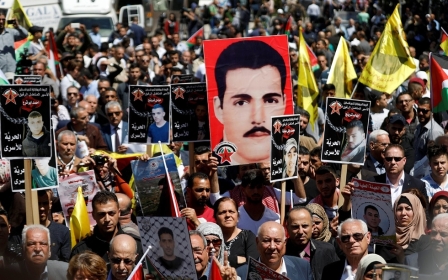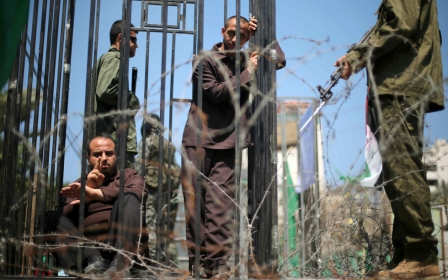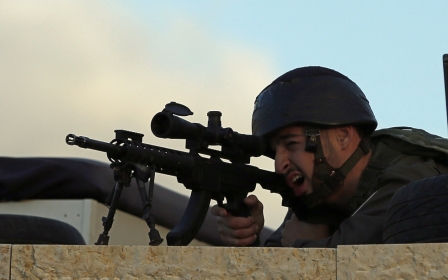Palestinians slam Israel for refusing talks with hunger strikers
Palestinian leaders on Wednesday denounced Israel's refusal to negotiate with Palestinians who are on hunger strikes in Israeli jails, warning of a "new intifada" if any of them die.
About 1,500 Palestinian prisoners have joined the hunger strike that began on Monday, according to Issa Qaraqe, head of detainees affairs for the Palestinian Authority.
Contacted by AFP, Israel's prison service declined to comment on the number.
The hunger strike has been led by prominent prisoner and popular Palestinian leader Marwan Barghouti, who is serving five life sentences over his role in the Second Palestinian Intifada, or uprising.
The prisoners have made a range of demands, from better medical care to access to telephones.
Some 6,500 Palestinians are currently detained by Israel for a range of offences and alleged crimes. About 500 are held under administrative detention, which allows for imprisonment without charge.
Palestinian prisoners have mounted repeated hunger strikes, but rarely on such a scale.
Qaraqe said the strike followed months of attempts at negotiations with Israeli authorities.
"If their demands are not met, more prisoners will join the strike," he said. "We have asked the international community and the UN to intervene immediately."
He added that if prisoners die, "that could lead to a new intifada".
Israeli officials have vowed not to negotiate with the hunger strikers. The public security minister, Gilad Erdan, on Tuesday called them "terrorists and incarcerated murderers".
Justice minister Ayelet Shaked said that authorities "would not hesitate to implement the law which authorises the force-feeding of detainees".
The controversial law passed in 2015 concerns hunger strikers whose life is deemed in danger.
Defence minister Avigdor Lieberman said he wanted to take the approach of former British prime minister Margaret Thatcher, who publicly refused to accede to the demands of IRA hunger strikers in 1981, 10 of whom died.
Qaraqe accused Israeli officials, including the prime minister, Benjamin Netanyahu, of "incitement" against the prisoners".
Shawan Jabarin of Palestinian rights group Al-Haq said invoking the force-feeding law would be "tantamount to torture".
Barghouti is popular among Palestinians, with polls suggesting he could win the Palestinian presidency.
While many Palestinians view him as a hero, Israelis point to the bloody suicide attacks of the Second Intifada of 2000-2005 and his role in the uprising.
He was convicted of attacks that killed five people, though declined to defend himself and did not recognise the court's legitimacy.
For Palestinians, the prisons have become a stark symbol of Israel's occupation.
Some 850,000 Palestinians have been incarcerated since the start of Israel's occupation 50 years ago, Palestinian leaders say.
Middle East Eye propose une couverture et une analyse indépendantes et incomparables du Moyen-Orient, de l’Afrique du Nord et d’autres régions du monde. Pour en savoir plus sur la reprise de ce contenu et les frais qui s’appliquent, veuillez remplir ce formulaire [en anglais]. Pour en savoir plus sur MEE, cliquez ici [en anglais].




